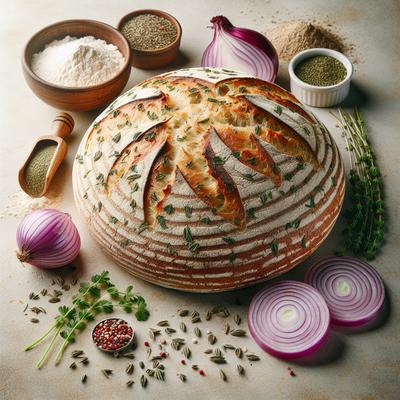Sourdough Onion Herb Bread
Elevate your bread-baking game with this fragrant and flavorful Sourdough Onion Herb Bread, a stunning artisan loaf infused with caramelized onions and fresh herbs like rosemary, thyme, and parsley. This rustic bread combines the tangy depth of sourdough with the savory sweetness of golden-brown onions cooked to perfection in olive oil. The recipe guides you through classic techniques like stretch-and-folds and overnight fermentation for a beautifully airy crumb and crispy crust. Ideal for pairing with soups, cheese boards, or enjoying on its own, this homemade bread is a true showstopper. Whether you're a seasoned baker or a sourdough novice, this recipe promises a rewarding, bakery-quality result every time!
Try SnapCalorie's FREE AI assisted nutrition tracking free in the App store or on Android.

Scan with your phone to download!

Ingredients
- 150 g Active sourdough starter
- 500 g Bread flour
- 350 ml Water
- 10 g Salt
- 1 large Yellow onion, finely diced
- 15 ml Olive oil
- 2 tsp Fresh rosemary, finely chopped
- 1 tsp Fresh thyme, finely chopped
- 1 tsp Fresh parsley, finely chopped (optional)
Directions
Step 1
In a small skillet, heat the olive oil over medium heat. Add the diced onion and cook, stirring frequently, until caramelized and golden brown, about 15 minutes. Remove from heat and let cool completely.
Step 2
In a large mixing bowl, combine the active sourdough starter, bread flour, and water. Mix until a shaggy dough forms. Cover the bowl and let the dough rest for 30 minutes (autolyse).
Step 3
After the rest period, add the salt and mix well into the dough by gently folding or kneading it. Incorporate the cooled caramelized onions, rosemary, thyme, and parsley (if using) into the dough until evenly distributed.
Step 4
Perform a series of stretch-and-folds: With wet hands, gently pull one side of the dough and fold it over onto itself. Rotate the bowl and repeat three more times. Cover the dough and repeat this process every 30 minutes for a total of 4 times to build dough strength.
Step 5
After the final stretch-and-fold, cover the bowl and let the dough bulk ferment at room temperature for about 4-6 hours, or until it has doubled in size.
Step 6
Lightly flour a work surface and turn out the dough. Shape it into a round or oblong loaf by gently patting it out and folding it into the desired shape. Place it seam-side up into a floured proofing basket or bowl lined with a clean kitchen towel.
Step 7
Cover the loaf and let it proof at room temperature for an additional 1-2 hours, or until it becomes puffy but not over-proofed. Alternatively, refrigerate the loaf overnight for a slow fermentation.
Step 8
Preheat your oven to 250°C (475°F) with a Dutch oven or baking stone inside for at least 30 minutes.
Step 9
Carefully invert the proofed dough onto a sheet of parchment paper. Score the top of the dough with a sharp knife or lame to allow it to expand properly during baking.
Step 10
Transfer the dough (on the parchment paper) into the hot Dutch oven, cover with its lid, and bake for 20 minutes. Remove the lid and continue baking for an additional 20 minutes, or until the crust is deep golden brown and the bread sounds hollow when tapped on the bottom.
Step 11
Allow the bread to cool completely on a wire rack before slicing and serving.
Nutrition Facts
| Serving size | (1230.7g) |
|---|
| Amount per serving | % Daily Value* |
|---|---|
| Calories | 2104.3 |
| Total Fat 22.7g | 0% |
| Saturated Fat 3.9g | 0% |
| Polyunsaturated Fat 1.3g | |
| Cholesterol 0mg | 0% |
| Sodium 3963.9mg | 0% |
| Total Carbohydrate 414.0g | 0% |
| Dietary Fiber 18.6g | 0% |
| Total Sugars 10.0g | |
| Protein 63.7g | 0% |
| Vitamin D 0IU | 0% |
| Calcium 151.4mg | 0% |
| Iron 23.4mg | 0% |
| Potassium 823.6mg | 0% |
Source of Calories
